
Breaking the mold
George Guidoni
Design & Innovation Sustainability Coding & Labeling Plastic Printing Robotics E. Hofmann Plastics Inc. IML (in-mold labeling) KeurigOntario plastics processor leverages packaging sustainability as key competitive advantage to propel market share growth to the next level
Seeking adversity for its own sake is not something most businesses willingly choose to engage in. But when adversity is thrust upon you, being able to turn it into an opportunity is a classic hallmark of business acumen and leadership.
And for the much-derided and criticized global plastic packaging industry, companies like the Orangeville, Ont.-based E. Hofmann Plastics Inc. offer plenty of inspiration and incentive to accelerate its carbon footprint reduction efforts—not only for the industry’s sake, but for the greater well-being of modern consumer society at large.
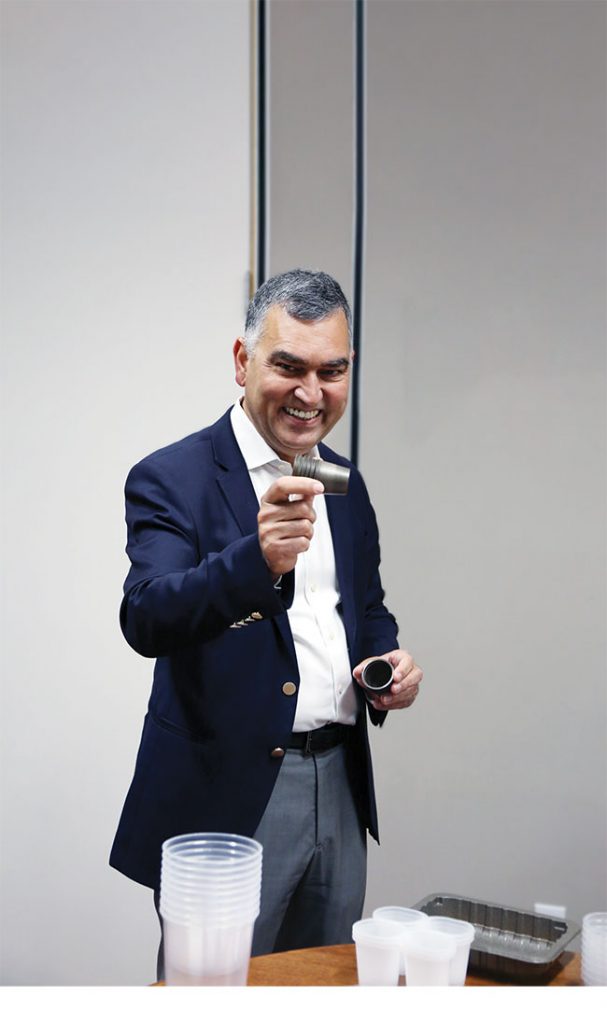
Hofmann Plastics president and chief executive officer Paul Kalia shows off the compostable single-serve coffeepods developed by his company as a practical environmentally-friendly solution to the conventional plastic coffee capsules that have attracted widespread criticism and consumer backlash for being exceptionally difficult to recycle in many municipal waste diversion programs.
“We consider ourselves to be carbon-footprint busters,” states company president and chief executive officer Paul Kalia.
“We are the disruptor in an industry that badly needs disruption to remain a viable global business that offers practical and sustainable solutions for the packaging of food and other everyday consumer goods and commodities.”
Founded back in the 1980s by Austrian-born entrepreneur Ernst Hofmann, the privately-owned company started out as a manufacturer of large-format plastic pails used primarily for transporting and storage of liquid and powder foodstuffs, industrial chemical, building materials and other such bulk commodities.
While filling this relatively narrow market niche provided a fairly safe and steady way to earn a living for the firm’s original four co-owners right through the turn of the century, the onset of global economy and offshore competition made it imperative for Hofmann to expand its horizons through product diversification and value-added manufacturing to remain relevant, according to Kalia.
Soon after completing the company’s move to the current manufacturing facility in Orangeville from its initial location in Brampton, Ont., in 2006, Kalia took over the sole ownership of Hofmann Plastics a couple of years later, while initiating a far-reaching transformation of the company’s strategic direction and modus operandi.
In addition to completely overhauling the refurbishing the newly-purchased Orangeville facility that once housed a manufacturer of tractor-trailers, the company invested in new production machinery and in-house R&D (research-and-development) capabilities in order to shift the company’s focus to value-added manufacturing, technological innovation and packaging sustainability.
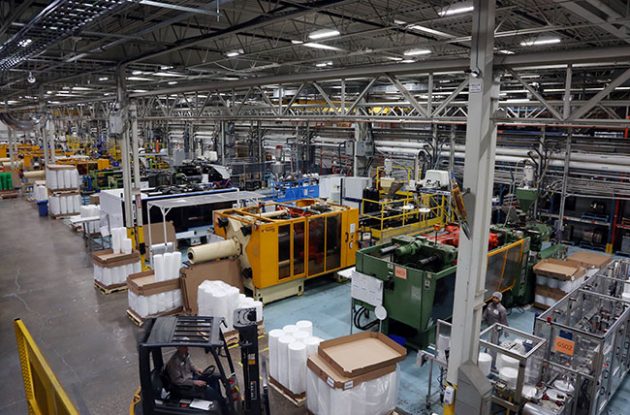
The 180,000-square-foot Hofmann Plastics production facility in Orangeville is an around-the-clock 24/7 operation housing an extensive array of advanced injection-molding, thermoforming and co-extrusion machinery to produce a wide variety of packaging products, ranging from heavy-duty plastic pails use to package bulk-liquids and powder products to tiny portion cups and coffee capsules for leading food-and-beverage producers and foodservice operators.
Just over 10 years since the start of that transformation, Hofmann Plastics appears to be hitting its stride in spectacular leaps and bounds.
Currently housing 20 injection-molding machines, 11 high-performance thermoforming lines, three extrusion lines with capabilities of up to seven layers and five inline industrial printers, the 180,000-square-foot facility is nowadays a yearround 24/7 manufacturing operation employing over 150 people to produce a diverse and growing range of plastic packaging products for customers in the food, construction and chemical industries across North America.
“We ship our products virtually anywhere within a 1,000-mile radius of our plant,” says Kalia, “with U.S. becoming a very important export market for us.”
Industrial plastic pails still account for about a half of the company’s total production output, but the entire product range has been upgraded exponentially with incorporation of new value-added features and size options.
Produced on the plant’s high-performance injection-molding machines, the tamper-evident round pails range from one-quart to 4.5-gallon volume capacity and offer a choice of plastic or metal handles, as well as seven different varieties of flex spouts for the lids, which are supplied with or without gaskets as per customer specs.
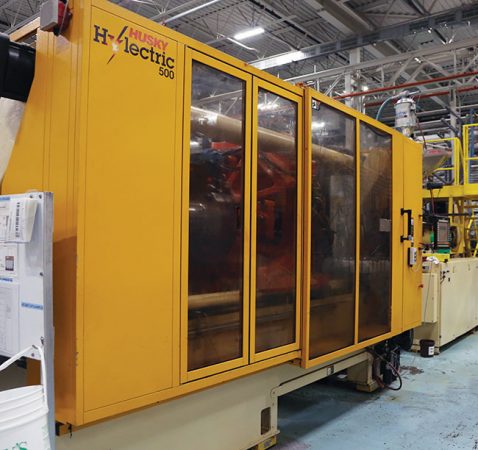
A close-up view of one of several Husky Hylectric 500 injection-molding machines, controlled by Bosch Rexroth’s compact and energy-efficient Indradrive servodrive technology, used to manufacture many of the company’s rigid plastic packaging products for the food, construction, chemical and other industries.
A primary supplier of retail five gallon buckets, Hofmann also produces a variety of food-grade pails and buckets for transporting bulk quantities of olive oil, margarine, mayonnaise and other foodstuffs, along with several sizes of yogurt containers—all available with upscale decorating options that include dry offset printing (up to six colors) and IML (in-mold labeling).
For all that, Kalia is even more excited about the company’s fast-growing food container business, which is now starting to pay off in a big way for all the extensive R&D investment carried out by Hofmann Plastics over the last 10 years.
“We are well on our way of becoming industry leaders in polypropylene thermoforming in less than 10 years of installing our first thermoforming line,” Kalia states, citing the more recent installation of an
advanced co-extrusion line machinery at the plant to spur further thermoforming innovation.
“In the past, resin manufacturers would do their own R&D and then tell processors like us what we would be able to do with it on our end,” Kalia recalls.
“That’s why we decided to invest into our own in-house lab, hire our own PhDs to spearhead our R&D efforts, and partnered up with many local universities to take this company to the next level,” Kalia explains.
“Our test lab is a good as any other lab in the word,” he extols, “while having in-house R&D capabilities has made us a full-service packaging company with world-class injection-molding, co-extrusion and thermoforming capabilities.”
As Kalia relates, the installation of new co-extrusion equipment has given the company formidable new competencies in the development of new value-added plastic food packaging products—such as deli containers, case-ready trays and single-serve coffee pods—incorporating breakthrough sustainability advantages, superior shelf-life properties and robust antimicrobial protection.
“We made a big push in thermoforming in the last four years,” he explains, “and in the last couple of years some of those things are really starting to bear fruit.
“The co-extrusion line is responsible for bringing to life many innovations developed by our internal R&D team by allowing us to formulate many different types of polymers to achieve different attributes,” Kalia elaborates.
“Although it’s just a standard co-extrusion line, we have done a fair bit of modifications on it in terms of making it robotically-operated and completely computer-controlled.”
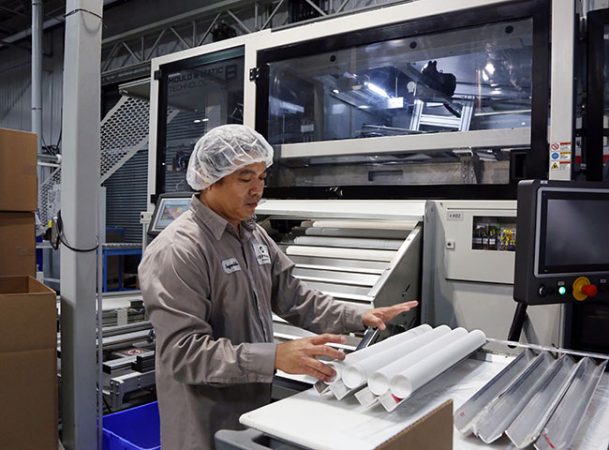
A Hofmann Plastics machine operator arranges stacks of plastic food portion cups coming off one of the busy plant’s many high-performance thermoforming machines prior to bagging them for shipment to customer.
According to Kalia, the past year has been the most productive one in the company’s history in terms of launching new innovative packaging products ready for large commercial-scale use—all offering notable sustainability advantages.
For example, the company’s polypropylene case-ready meat trays incorporate a special foaming formulation that makes them 30 per cent lighter than conventional PP trays, according to Kalia.
Made with EVOH (ethylene vinyl alcohol copolymer) barrier co-extrusion to provide maximum product freshness and shelf-life, the fully-recyclable, microwave-safe trays are designed to withstand the rigors of automated packaging lines and distribution networks with easy de-nesting and simplified automated loading, while offering higher temperature tolerance the conventional PP trays.
Available in a broad variety of sizes and depths to suit an expanded gamut of beef, fish, pork, deli-meats and produce packaging applications, the lightweight trays are treated with Hofmann’s proprietary antimicrobial technology that kills harmful microbes such as salmonella and listeria on contact.
Even more impressively, the company has also developed a fully-compostable case-ready trays made from renewable plant-based resins and biomass.
“We are really excited to offer our compostable case-ready meat trays that are made from a renewable and sustainable resources without compromising on the packaging performance,” Kalia states.
“Everything we have used to make these trays is certified as compostable material, he says, “and our compostable plastic has an oxygen transmission rate that is twice as effective as conventional packaging.”
While packaging sustainability has become one of the company’s core guiding principles in new product development, Kalia says the plastic industry has to play a more active role in educating its customers and consumers about the significant differences between various approaches to packaging sustainability.
“In addition to reducing the carbon footprint by making our containers significantly lighter, we also focus on recyclability and compostability to meet our customers’ needs for sustainable packaging options,” he says.
“If there are some things that should not be recyclable, like dirty trays containing product residue, then we will strive to make that packaging compostable, so that eventually it biodegrades completely.
“Not everything should be recyclable and not everything should be compostable,” Kalia states, “but sustainability in one form or another should always be an option.
“That’s what makes us different from many other plastic packaging producers out there—industry disruptors, if you will.”
This disruption is fittingly encapsulated in the development of the company’s compostable single-serve coffee pods earlier this year, along with compostable portion cups for sauces, dips, hummus and other single-serve products.
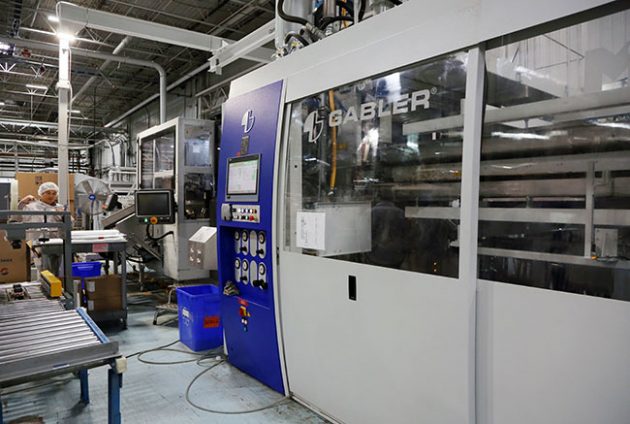
The Hofmann Plastics plant had made significant capital investments over the last few years to equip the facility with the best-in-breed plastics processing technologies, such as this hybrid Gabler thermoforming machine.
Kalia says the main reason that leading coffee producers have been largely unable to develop a fully sustainable option for single-serve coffee that can overcome widespread public criticism of coffee pods as being inherently harmful to the environment is it focused exclusively on the recyclability of used coffee capsules, without exploring other options.
By making the Keurig-compatible cups from fully biodegradable materials, the Hoffmann capsules can be safely disposed of for good in industrial composting facilities without leaving a trace, he points out, while also not requiring the consumers to perform the various cleaning and separation steps required to make used plastic capsules to recycling-ready for all the different municipal wastestreams.
“People buy single-serve coffee capsules for the convenience,” Kalia points out, “so it’s unrealistic to expect these people to spend time separating all the different components after use to make those pods recyclable—there’s no convenience in that.
“With our compostable cups, the pod is ready for composting right after you’ve made your coffee—no need to remove anything,” says Kalia, noting that the compostable pods provide the same one-year shelf-life for the coffee as the conventional plastic pods.
“These compostable K-cups let consumers enjoy consistently fresh of coffee guilt-free, being made from both industrial and natural compostable materials,” he says.
“Our unique process of blending biomass and these materials creates a rigid and effective capsule that is substantially more environmentally-friendly than any other packaging solution available in today’s market,” says Kalia, adding the company invested millions of dollars into the development of these biodegradable pods.
“We have made tremendous strides to be ahead of the industry when it comes to developing products that reduce our impact on the environment,” Kalia states.
“To that end, we will be working even more closely with municipalities, waste companies and our customer partners across North America to move the needle even further in this area.”
Looking forward, Kalia says he is confident that the plastics industry will be able to address many of the environment-related issues facing it.
Says Kalia: “The way we consume food today would be very dramatic if it weren’t for some important plastic packaging innovations over the last 20 years.
“From extending shelf-life to limiting portion size, the industry has always found ways to help improve the consumers’ relationship with food,” he states, “and it will continue to do so by keeping up-to-date with consumer trends to enable proper direction for future R&D and new innovative packaging solutions.”
Advertisement

